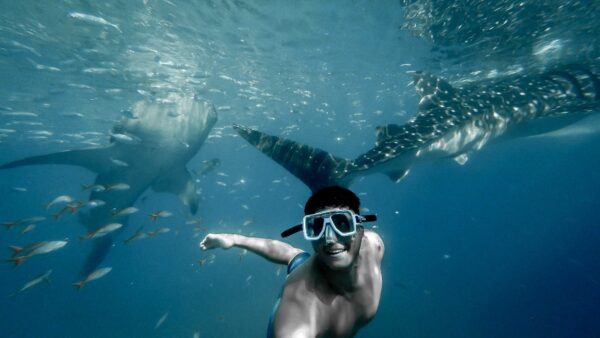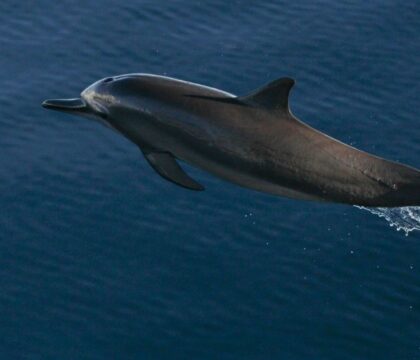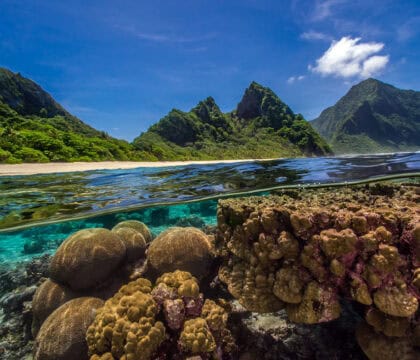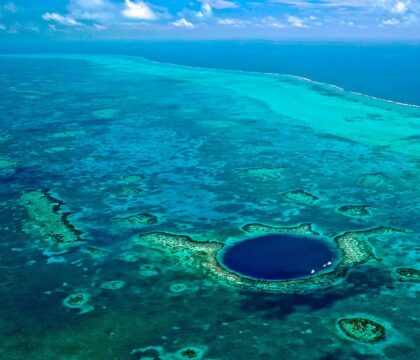July 31, 2019 • Travel Ideas
Whale sharks are the largest fish on Earth and can reach lengths up to 40 feet and weigh around 40,000 pounds! ©Michael L.
“Sharks are beautiful animals, and if you’re lucky enough to see lots of them, that means that you’re in a healthy ocean. You should be afraid if you are in the ocean and don’t see sharks.” Dr. Sylvia Earle, Oceanographer & Oceanic Society Board Member
Found throughout most of the world’s oceans and ranging in size from less than a foot to upwards of 40 feet in length, sharks are a diverse group of ecologically, culturally, and economically important animals. Responsible, regulated shark tourism can create safe, fintastic experiences that provide benefits for sharks and local economies! Swimming, snorkeling, and/or diving with sharks is done all over the world, generating hundreds of millions of dollars and supporting thousands of jobs each year. We’ve compiled a list of our most jawesome expeditions where you have the opportunity to swim with these special animals.
7 Jawesome Expeditions to Swim with Sharks
Expeditions in Indonesia
Raja Ampat is home to “walking” epaulette sharks (pictured), wobblegong sharks, whale sharks, blacktip and whitetip reef sharks, and grey reef sharks. ©Wayne Sentman
Raja Ampat, Indonesia: With Raja Ampat declared a sanctuary for sharks and manta rays in 2013, the opportunity to see these wonderful animals will be assured well into the future.
- Raja Ampat Archipelago by Liveaboard
- Raja Ampat: Coral Triangle Adventure
- Raja Ampat Small Group Snorkeling Adventure

Endangered scalloped hammerheads are recognizable by their wide, wavy heads. They are not known for being aggressive towards people, and have even been described as shy! © John Voo (CC BY 2.0)
Banda Sea, Indonesia: The Banda Sea is home to “Hammer Island,” a remote location where endangered scalloped hammerhead sharks are known to school in large numbers. Since 2013, Indonesia has declared 5 species of shark species, including the scalloped hammerhead, as protected species.
Expeditions in Palau (Micronesia)
Palau is a great place to see reef-associated species including zebra sharks, grey reef sharks, blacktip (pictured) and whitetip reef sharks. © Keoki Stender
Palau’s decisive efforts to ban commercial fishing, to create a shark sanctuary, and to set aside fully protected marine areas are combining to help fish populations thrive. And while in most areas of the world it is becoming increasingly rare to see sharks, Palau’s approach to conservation means that it is not unusual to see four or more shark species on your expedition.
Expedition in Mexico
Whale sharks are often described as docile, though indifferent may be a better term. They do not appear to notice snorkelers and divers that keep a respectable distance, but may swim away if they feel threatened or harassed. © Wayne Sentman
Whale sharks are protected in Mexico, and the federal government has established regulations for tourism operators and visitors, designed to protect the endangered whale sharks and allow tourism that supports local communities.

Responsible, regulated shark tourism can create safe, fintastic experiences that provide benefits for sharks and local economies! ©Jakob Owens





